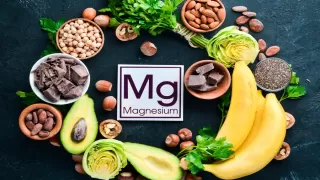Digestive health is one of the most essential pillars of overall well-being. It impacts everything from immunity and skin health to energy levels, mental clarity, and even sleep. Despite being so crucial, it is often ignored in day-to-day life until something goes wrong. In truth, maintaining a healthy gut isn’t complicated; it’s about making the right food choices consistently.
Gut health depends significantly on the foods we eat and how effectively those foods move through the digestive tract. While trendy supplements and cleanses often get all the attention, it’s regular foods in your kitchen that quietly make the most difference. In this article, we explore how probiotics, prebiotics, fiber, hydration, and mindful eating contribute to efficient and balanced digestion.
Why Gut Health is Important
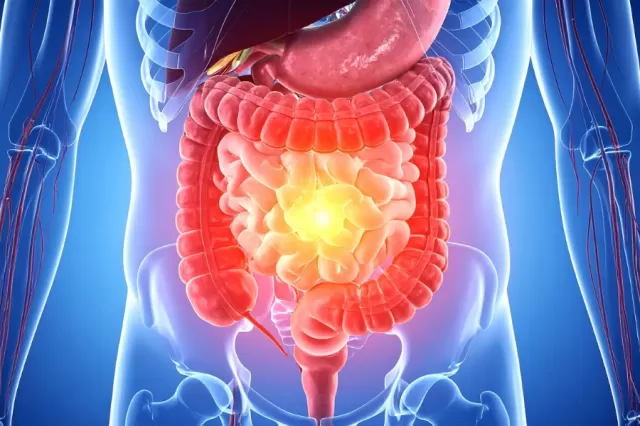
The gut is sometimes called the “second brain” because of the vast network of neurons it contains and the neurotransmitters it produces, such as serotonin. A healthy gut improves mood, reduces inflammation, supports immunity, and enhances nutrient absorption. Poor digestive health can lead to issues such as bloating, fatigue, mood swings, nutrient deficiencies, and weakened immunity.
The digestive system includes several organs, starting from the mouth and ending at the colon. Each plays a role in breaking down food, absorbing nutrients, and expelling waste. A disruption anywhere along this tract can trigger discomfort or disease, making it essential to support the system regularly through thoughtful eating.
Probiotic Foods
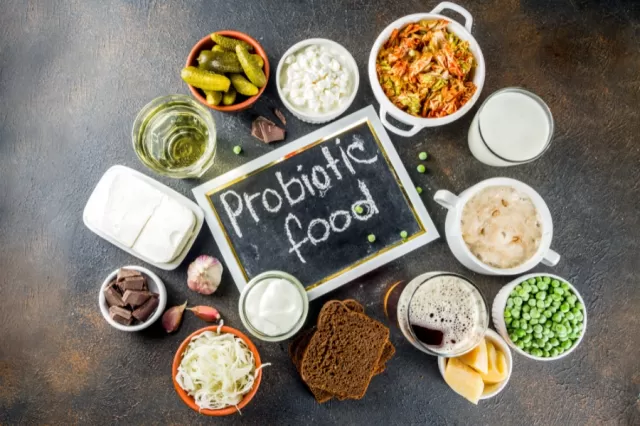
Probiotics are beneficial bacteria that help maintain the natural balance of organisms in the gut. They prevent harmful bacteria from overgrowing and help break down food more effectively. Research has shown that probiotics can help manage symptoms of irritable bowel syndrome (IBS), inflammatory bowel disease (IBD), diarrhoea, and even depression.
Key probiotic-rich foods include:
- Yoghurt: Packed with live cultures like Lactobacillus, it supports bowel regularity and reduces inflammation.
- Kefir: A fermented milk drink richer in probiotics than yoghurt, often suitable for lactose-intolerant individuals.
- Sauerkraut and Kimchi: Fermented vegetables that contain natural probiotics and digestive enzymes.
- Miso and Tempeh: Fermented soy products rich in protein and gut-friendly microbes.
- Kombucha: Fermented tea that's rich in probiotics and antioxidants.
Choosing products labelled with “live and active cultures” ensures you're getting real probiotic benefits. Regular consumption supports better digestion, improves regularity, and boosts immune function over time.
Prebiotics
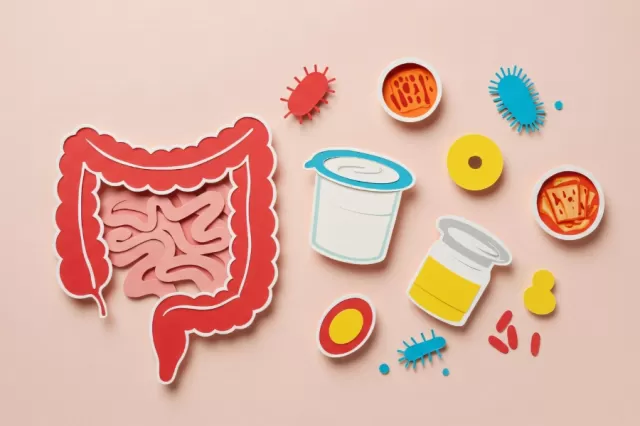
Prebiotics are the fuel probiotics need to thrive. They are a type of non-digestible fibre that travels through the digestive tract to feed healthy bacteria. Think of prebiotics as fertiliser for the good bugs in your gut; without them, probiotics can’t survive long enough to bring benefits.
Popular prebiotic foods include:
- Garlic and Onions: These everyday ingredients are rich in inulin, a strong prebiotic.
- Bananas: High in fibre and prebiotics, especially when slightly under-ripe.
- Asparagus: Contains compounds that enhance the growth of friendly bacteria.
- Whole Grains: Such as barley, oats, and wheat bran, providing sustained fibre.
- Legumes: Beans, lentils, and chickpeas feed gut bacteria and provide proteins.
By combining probiotics (the “good bacteria”) with prebiotics (the “bacterial food”), you create a synergistic relationship called synbiotics, a powerful combination that enhances digestive resilience and supports long-term gut health.
The Power of Fibre in Everyday Digestion
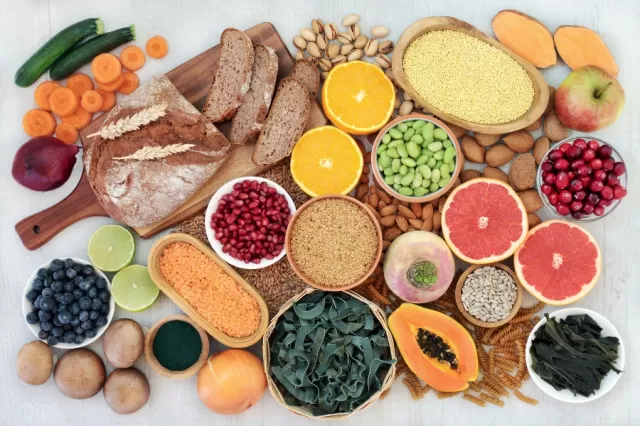
One of the most overlooked but critical nutrients for digestion is fibre. It adds bulk to stool, helps food move efficiently through the colon, and supports regular bowel movements. Fibre also reduces cholesterol levels, stabilises blood sugar, and helps maintain a healthy weight.
There are two main types of dietary fibre:
- Insoluble Fibre: This type doesn’t dissolve in water. It adds bulk to stool and is found in whole wheat, bran, brown rice, carrots, and celery.
- Soluble Fibre: Dissolves in water to form a gel-like substance and slows digestion, helping nutrient absorption. Found in oats, apples, beans, nuts, and citrus fruits.
Most adults need around 25–30 grams of fibre daily, but many fall short. A gradual increase in fibre intake, combined with adequate water consumption, is crucial to avoiding discomfort.
Hydration

Water is essential for softening stool and preventing constipation. It also helps digestive enzymes function effectively as they break down food. Herbal teas, coconut water, and water-rich fruits like watermelon and cucumber also contribute to hydration. Avoiding excessive caffeine and sugary drinks can also support better digestive balance.
Habits That Support Gut Health
While diet forms the foundation of good gut health, certain lifestyle habits also make a difference:
- Chew Thoroughly: Digestion begins in the mouth. Proper chewing reduces strain on the stomach and intestines.
- Eat Mindfully: Eating slowly and avoiding overeating helps prevent bloating and indigestion.
- Exercise Regularly: Physical activity stimulates the muscles of the digestive tract and promotes regularity.
- Manage Stress: Chronic stress disrupts gut function and may trigger digestive disorders over time.
- Sleep Well: Adequate sleep is linked to lower inflammation and improved digestion.
Foods to Avoid or Limit
Just as certain foods benefit digestion, others may harm it. These include:
- Highly processed foods: Lack fibre and add chemicals that disrupt gut bacteria.
- Artificial sweeteners: May change gut microbiota negatively.
- Excessive red meat or fried foods: Harder to digest, can worsen acid reflux.
- Alcohol and caffeine overload: Can irritate the digestive lining.
By reducing these triggers and embracing nutrient-rich foods, you take meaningful steps toward a healthier digestive system.
The Gut-Microbiome Connection
The gut microbiome is home to trillions of bacteria, viruses, and fungi that help digest food, produce vitamins, and protect against pathogens. Every dietary choice influences the diversity and strength of this ecosystem. A diverse microbiome is associated with better mental health, heart health, metabolism, and immunity.
Eating a variety of whole, plant-based foods ensures that different types of bacteria can thrive, making your digestive system more adaptive and resilient.
Achieving better digestion doesn’t require dramatic overhauls or restrictive eating. Start with small, consistent changes. Add a spoonful of yoghurt to breakfast. Include an extra serving of vegetables with dinner. Switch to whole-grain bread. Sip water throughout the day.
These everyday choices serve your gut in quiet ways, fueling good bacteria, moving food smoothly, and supporting your overall health. The digestive system works best when supported daily, not stressed or deprived.
By prioritising natural probiotics, nourishing prebiotics, balanced fibre, and hydration, you set the tone for a healthier gut, and a healthier you.
















